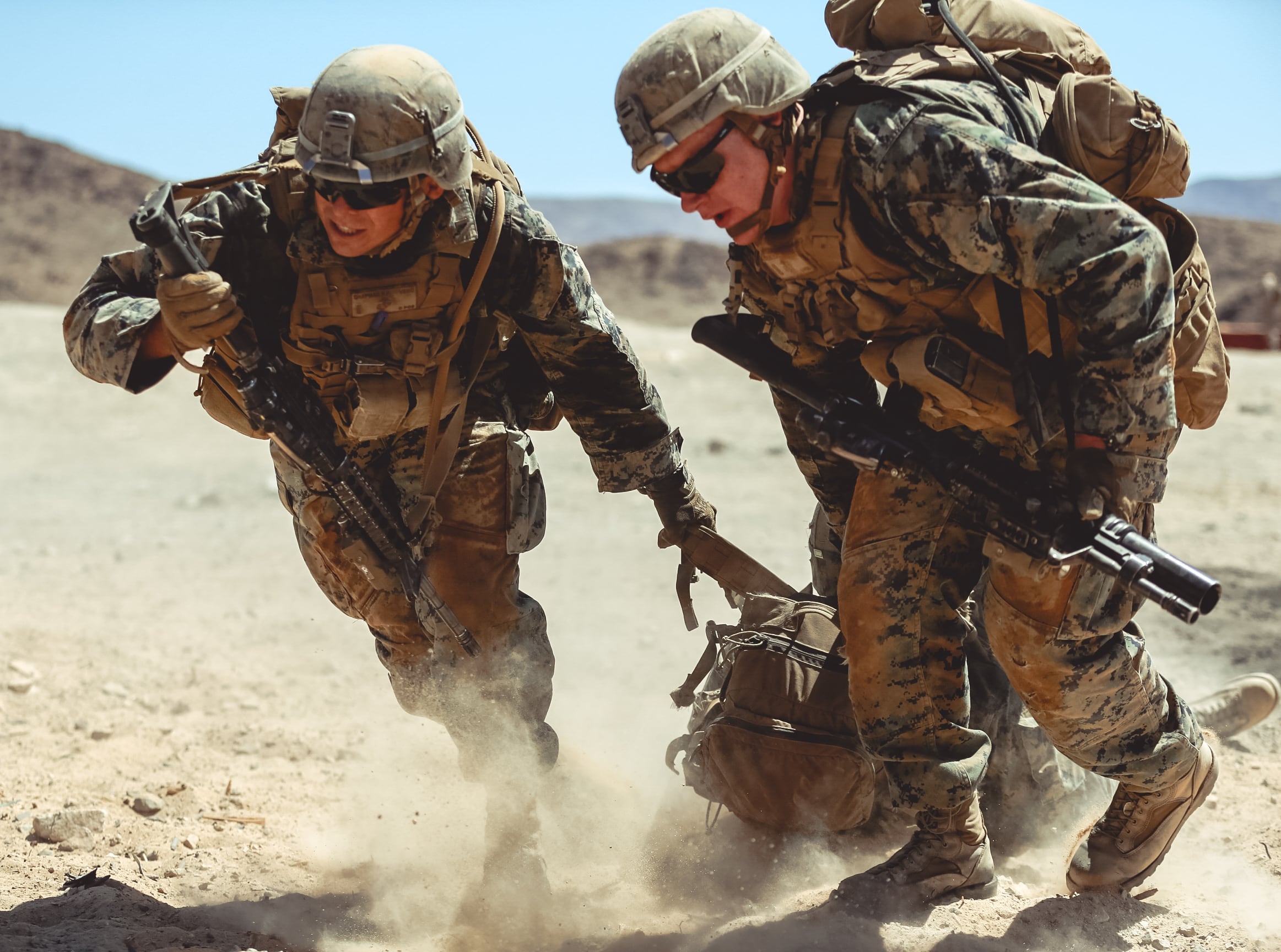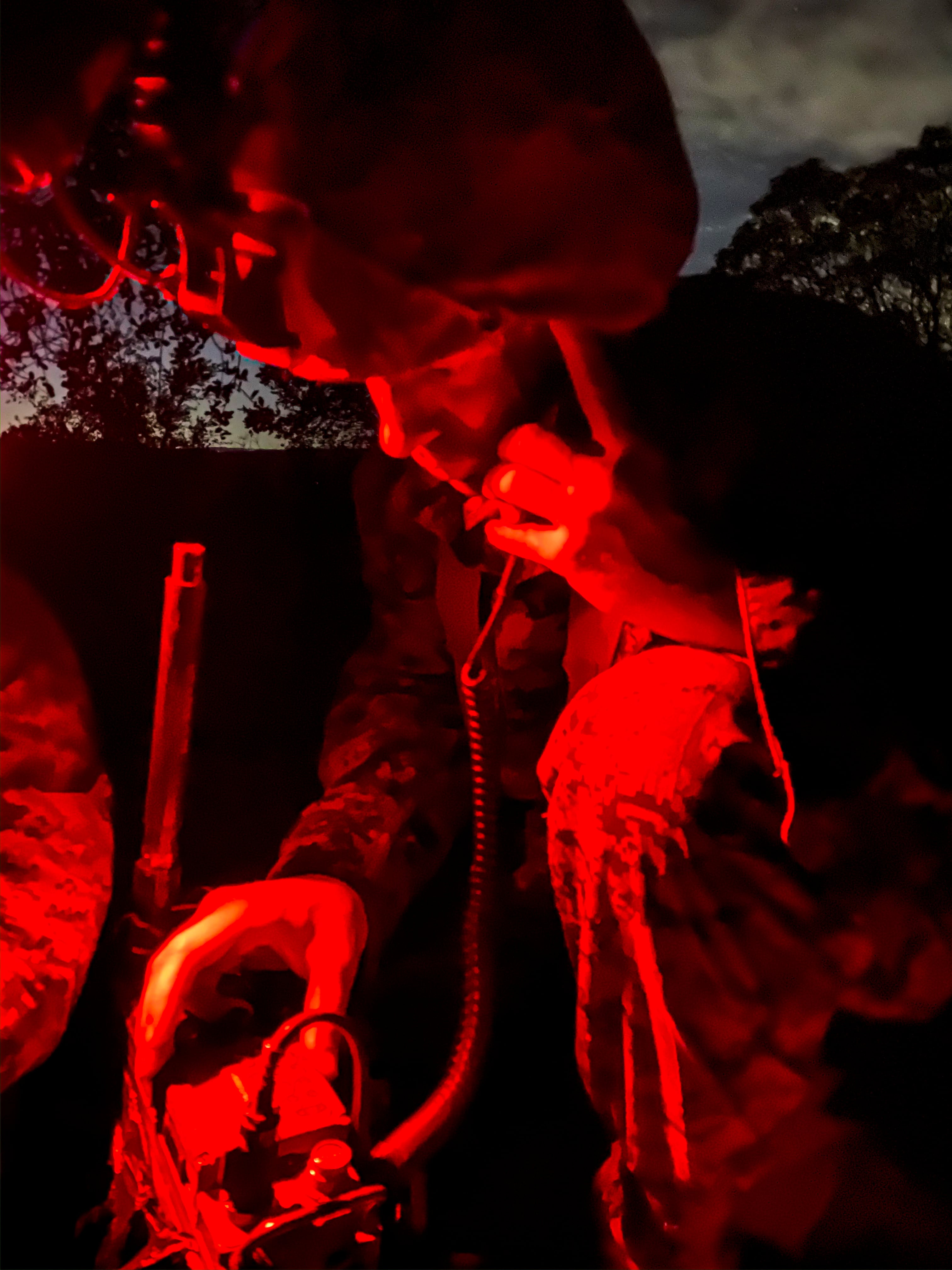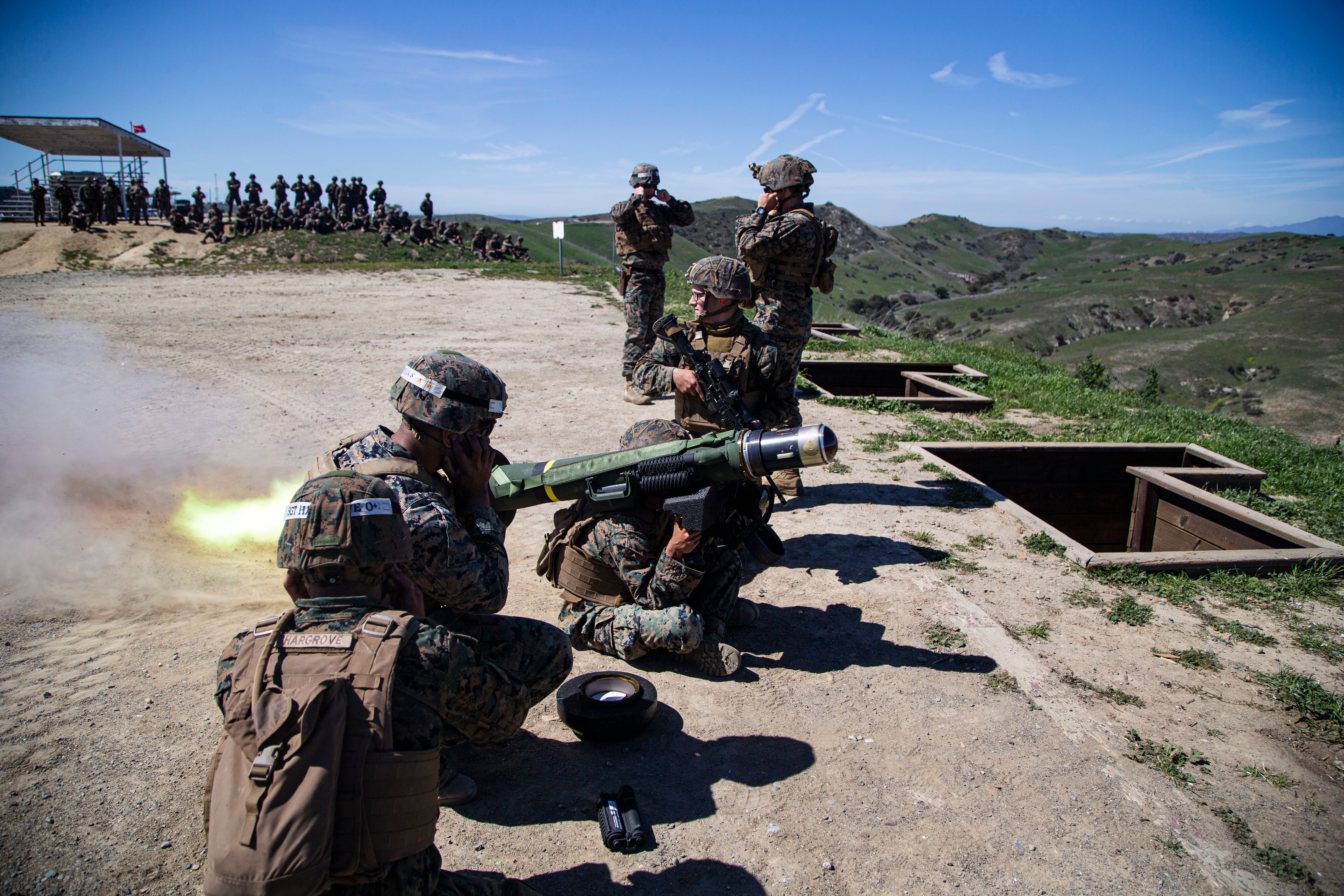CAMP PENDLETON, California ― On a bright April afternoon in southern California the battalion gunner for the Marine Infantry Training Battalion–West paced nervously along a pool as young Marines jumped in with their packs and weapons.
The Marines were conducting a 300-meter simulated swim to shore with all the gear they would need for the next three days of their capstone event for the initial Infantry Marine Course.
Though the Marines had spent at least one day a week for the past 14-weeks in the pool, this was the first time the three platoons of Alpha Company had ever attempted anything close this specific exercise.
For battalion gunner Chief Warrant Officer A.J. Pasciuti ― who has served for 20 years with multiple combat tours, including time as a reconnaissance sniper — watching this was the most nervous he has been in his career.
RELATED

The swimming event encapsulated the spirit of the new Infantry Marine Course that Pasciuti helped birth.
That course is a new experimental School of Infantry curriculum, designed with an additional five weeks and to teach aspiring grunts new lessons and prepare them to take on more responsibility.
And now, in the first capstone event of the new course, it was all coming down to the wire.
‘More competent’
Pasciuti knew the Marines knew how to swim.
In fact, 90 percent of the Marines in the course qualified in the intermediate swimmer level ― one normally not even attempted until Marines get to the fleet.
They would be given a task and told the situation, but it was now entirely up to them to complete the mission.
Some of the students took off, powering through the 300-meter swim while squad mates struggled.
Eventually, the company learned that teamwork would get them all through the swim faster than going alone. The Marines started to tie their rucks together and use them as small flotation devices, carrying three to four students at a time.
It was a success, showing just how far these Marines had gone during the training cycle.
“I guarantee you can throw them off a boat 300 meters out safely, day or night,” Lt. Col. Walker Koury, commanding officer for Infantry Training Battalion–West, said while watching the Marines complete the exercise.
So far, the first iteration of the course has been a success, showing exactly how much a new Marine can learn in the schoolhouse if given the opportunity.
The new infantry Marines are “better trained, more adoptable, more competent,” than previous SOI graduates, Koury said.
But, despite that success the real challenge has just begun.
Questions of whether the new mindset and skills learned in the course will stay as Marines hit the fleet remain. As does the broader question of whether the Corps will keep up its end of the bargain, supporting the structural changes required to make this increased level of training the new Marine Corps standard.
The Corps is still working on how exactly to measure all these improvements. Some, like the mentality of the Marines, may never be fully quantifiable.
More quantifiable factors, like marksmanship, were closely monitored as Marines went through this new course for the first time.

Researchers with the Office of Naval Research digitally tracked the accuracy and speed of nearly every round Marines fired from their M-27s.
“There’s a watch that they’re wearing that tracks every shot that they take and exactly when they took it in relation to the start,” Joe Hamilton, one of the researchers, told Marine Corps Times.
The data is linked to a tablet used by the instructor to measure the accuracy of each shot, enabling the school to track exactly how well the Marines have done throughout the course, how much they improved, and how they compare to their peers.
The Corps is still analyzing that data as it prepares for the next three experimental iterations.
In the future, range data along with other potential metrics may be posted publicly for the students to help create a greater sense of competition within the course.
Of the 140 Marines who started the 14-week course only two were dropped, a higher success rate than the standard SOI class.
There were no discipline issues, no refusal to train and no liberty incidents, Pasciuti told reporters who had traveled to Camp Pendleton, California, to watch as the Marines kicked off the event.
Ready for the fleet
The 138 Marines who graduated are more competent on more weapons, know more secondary infantry skills ― from land navigation to communication ― than Marines who previously have graduated from the School of Infantry, according to the Marines who created and led the course.
“We would expect our graduates to be able to join their units in the fleet today … and be able to directly contribute to a successful infantry unit at a team level, a squad level, a platoon level,” Col. Coby Moran, the commander of School of Infantry-West said.
“If we, in the future, get into a fight tonight scenario where we do need to rapidly train and deploy Marines, our IMC graduates should be able to fight, win, survive on a future battlefield at a much greater level without that long predeployment training timeline,” he added.

The Marines are also more flexible than those in the past.
“Now you have a Marine who on the exact same day, at night will maneuver with support by fire, he will go that same night and switch positions so now he’s doing support by fire with the machine gun for another squad in his same platoon, and oh by the way he shot the LAW,” Koury said.
In the past, official training on the cross-section of those specific skills was only taught to staff noncommissioned officers and commissioned officers, Koury added.
“By accident we created tacticians,” because of the cross-training, Koury said.
Change in mindset
At one point late in the course, when one platoon of students was deployed in a defensive position, Pascuiti, Gunnery Sgt. Blake Burkhardt, the Infantry Training Battalion–West chief instructor, and a few other very experienced infantry Marines set off on a patrol to see if they could sneak up on the young students.
Instead, the tables were turned.
As the nine-man patrol laboriously worked its way up a steep hill on Camp Pendleton, California, the students spotted them.
“About two hours before I made contact with them, they made contact with me,” Pasciuti said of the ambush.
“They found us and then they watched us suffer for the next two hours as we were trying to make our way as sneaky as we could through some of the worse terrain we could find,” he added.
All on its own, the platoon stealthily moved into position to ambush the patrol.
Burkhardt said he could feel eyes on him for a few minutes, but was unable to spot the students before a machine firing blanks opened on them, “killing” the nine Marines before they had a chance to fight back.
“I stood up and I found a bunch of lasers cycling on my chest,” Pasciuti said.
The most shocking outcome from the course was that it created a Marine who at least partially had shed a mindset that often lingers as a hangover from boot camp.
Brand new Marines are often scared of independent thought and any interaction with leadership.
But at IMC, students felt bold enough to challenge the battalion commander to chess.
“It’s weird; they don’t even look like boots,” one of the combat instructors assisting with the final rifle marksmanship test told Marine Corps Times.
It was a sentiment often mirrored by the Marines who ran the course.
“They talk and act like Marines who have been in the fleet for two years,” Burkhardt said.
The revolutionary change in mindset did not come as a result of extended training time or extra skills taught, but by the radical decision to treat these privates and private first classes as adults, leaders said.
“These Marines are different,” Pasciuti said. “They are different because we treated them differently.”
“Marines are taught to ask why. Not why as in questioning, but why as in seeking information: ’What reason am I doing this?’ O.K., then I can have context and work toward it.”
The change was lauded by the instructors on and around the course ― many have long believed they could get more out of new Marines by treating them like adults and not mindless privates.
“I’ve always believed that if you expect somebody to perform, they will, they’ll be hungry to perform,” said Sgt. Harvey Evans, an 0352 anti-tank missileman providing support to Alpha Company.
Koury banned calling the students “kids” and banned any disrespectful treatment of them, helping turn the course from an extra phase of boot camp to one designed to train future platoon sergeants and squad leaders.
“If we change our language, if we change how we talk to them, it changes our mindset, it forces us because we think in the same way we speak,” Evans added.
Culture shock
There is some apprehension among instructors on how long this changed mindset will last, however.
When Marines hit the fleet and “senior lance corporals” are put off by these new and relatively free-thinking privates, things might change.
“It’s going to be a culture shock because you’re going to have the dude who has however many years of experience beforehand and this new and upcoming thing,” said Sgt. Austin Richey, a course instructor.
“There will probably be some tension where the senior lance corporals or NCOs are going to be like, ‘I know more than you, I’ve been on deployment,’ and these guys are coming straight out their basic infantry course straight off knowing just as much if not more,” he said.
In addition to the worry their new attitude will be beaten out of them in the fleet, instructors said they are worried Marines’ skills will go to waste if they are put into very basic 0311 roles, which normally are handed out to Marines straight from the School of Infantry.
To help protect these young Marines, they were sent to the fleet in the platoons they trained with at the Infantry Marine Course.
One platoon was sent to 2nd Battalion, 5th Marines, on Camp Pendleton, California; one to 1st Battalion, 3rd Marines, on Marine Corps Base Hawaii; and one to 1st Battalion, 2nd Marines, on Camp Lejeune, North Carolina.
The three battalions are slated to be part of the Marine Corps’ experiment with the Marine littoral regiment and taking a close look at the “arms room” concept that may see the Corps ditching its weapons companies.
There, Marines ideally will be used based on their skill-sets rather than just as basic rifleman, the leaders said. But it is still left to be seen, especially once they are no longer under Infantry Marine Course leadership.
Also, still to be seen is how dedicated the Marine Corps will be to the long-term adaptation of the extended course.
The current course is set to become the standard infantry training course by 2023, coinciding with the plan to consolidate infantry military occupational specialties.
But the course will require significantly more instructors to make it work.
“For the most part, if were to run it as is with the instructor cadre as is, is this sustainable? Maybe,” said Sgt. Preston Bundash, one of the course instructors. “But if we can get more instructors involved and we get all the support we can … Yes. We just have to beef it up a little more.”
Marines move through the course with 14 students assigned to one sergeant or staff sergeant instructor acting as a pseudo squad leader, a far cry from the past where roughly 300 students would be handed to just a handful of instructors.
“At the moment it’s just a lot,” Bundash said. “Sometimes you’re spending anywhere from 12 to 72 hours straight with these guys.”
To make the course work Corps-wide, the two schoolhouses would have to add 80 instructors.
To tempt more Marines to leave the fleet, the Corps is considering returning the combat instructor billet back to a special duty assignment, comparable to drill instructors, rather than the tier 1 screenable billet it is currently.
The change would make instructors eligible for another $150 in special duty assignment pay a month and would increase the priority of combat instructors for manpower purposes.
Ultimately, the Corps will have to commit to paying more money to move Marines through infantry school to the fleet at a slower rate.
The Corps also has more fine tuning to do as it evaluates the data and builds the final course form.
Brig. Gen. Jason Morris, the commander of Training Command, said the Corps may eventually extend the course to 18 weeks so that Marines can get more time on heavy machine guns and potentially more amphibious training.
“It will grow and iterate and change and develop overtime,” Morris said.
Burkhardt, standing next to the pool watching a squad of Marines perform their final Infantry Marine Course evaluation, said he hopes to get the Marines into the ocean for their water training in a future iteration of the course.
He also knows his work is just beginning.
“If the course is exactly the same in 10 years, we failed,” Burkhardt said.
Editor’s note: This story has been updated to say that the capstone event took place in April, and that Brig. Gen. Jason Morris is the commander of Training Command, not Training and Education Command.





